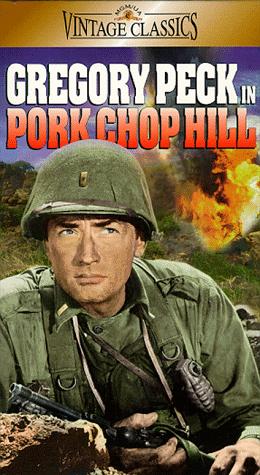 :
Study
Questions: Week Six
:
Study
Questions: Week Six  :
Study
Questions: Week Six
:
Study
Questions: Week Six
Korea I: The Cold War Heats Up
The Bridges at Toko-Ri (1954) and Pork Chop Hill (1959).
1. The opening of Pork Chop Hill stresses the historical accuracy of the events. What is the significance of this emphasis. How does it tend to give greater weight to the film's message?
2. What issues in American society generally are addressed in the conflict between Franklin, the black soldier, and Lt. Clemons? How does this subplot manage a socially acceptable way of resolving the conflict. How does it embody the idea of political consensus during the Cold War?
3. Notice that a woman plays the phonograph at the Chinese headquarters from which the propaganda broadcasts are made. What is her thematic significance? What does her presence say about communists and their values?
4. Why does the film include so many failures in the plans for assaulting the hill (i.e. the failure to destroy the barbed wire, the poor deployment of Company L, the failure to get Lt. Clemons his heavy weapons)? What is the thematic significance emphasizing them? Are they intended to suggest the failure of the planners? The distance between the commanders and the fighting men? Or, are they simply part of the chaos of front-line combat?
5. Why does the film open with Pvt. Forstman complaining about the failure of the battalion headquarters to get his rotation date correct? What does it have in common with Lt. O'Hashi's comment that his leave has been canceled?
6. What are the arguments offered for holding Pork Chop Hill, a place Lt. Clemons describes as a "stinkin' little garbage heap"? Why does he feel the battle is justified? How do the negotiators at Panmunjon defend the sacrifices? What do the G.I.s think? What do you think of the explanations? How do they reflect Cold War attitudes?
7. How might these reasons apply to the Korean War itself? And, for that matter, to the Cold War?
8. How do the actions and expressions of the Chinese negotiators at Panmunjon indicate they are to blame? What prompts one American negotiator say, "these aren't just Orientals, they're communists?
9. In the opening of the film, the Korean War is described as "the forgotten war" (which is the title of the best history of the War) and concludes with Lt. Clemons saying that there will be no memorials for places like Pork Chop Hill. Why would Americans want to forget this War?
10. What similarities can you see between the sacrifices made to hit the bridges at Toko-Ri and those made to recapture Pork Chop Hill? Is the Admiral's explanation of the need for sacrifices similar to those used to explain the Pork Chop Hill operations?
11. In what ways are the carrier operations, the technology of battle as much the subject of the film as the fate of Lt. Brubaker? Are these photogenic sequences interesting? Do they tend to glamorize the War in a way Pork Chop Hill does not? What are the reasons for your opinion?
12. What is the significance Brubaker's trip to Japan to see his family? How, if at all, is it related to the film's main plot? How does it express Cold War attitudes toward the family?
13. What is the significance of the Admiral recognizing his dead son in Lt. Brubaker? How did his son die? How does the paternal relationship between the men tend to humanize the military?
14. What does the nature of Brubaker's death (especially the visual aspect) say about the war itself? In what ways is it similar to the deaths on Pork Chop Hill? How do the Admiral Tarrant's final words ask viewers to consider a different interpretation of the War's value?
15. Enumerate the similarities between Lt. Brubaker and Lt. Clemons. Consider their character and temperament, their social backgrounds (implied), their attitudes toward the Korean War. What contrasts can you discern?